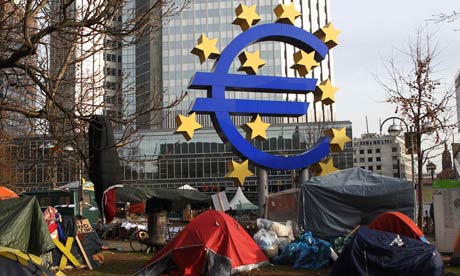Eurozone finance ministers have postponed another make-or-break meeting: the torture goes on for Athens
European policymakers seem to be nudging Greece closer to 'Grexit'. Photograph Alex Domanski/Reuters
With every day of prevarication and grandstanding over the future of Greece, Europe's power-brokers are nudging the crisis-hit country closer to the emergency exit.
If Angela Merkel, Nicolas Sarkozy and the Brussels elite were deliberately trying to prolong the agony for Greece's battle-scarred political class, they couldn't have done a better job.
After Lucas Papademos finally delivered a deal on the latest package of savage austerity measures last week, following tortuous negotiations with his coalition partners, he might have hoped for a quick rubber stamp from the "troika" of the EU, IMF and European Central Bank.
Instead, he was sent back to the drawing board to come up with another €300m-worth of cuts, against the backdrop of violent street protests.
Not only that, but his opposition partners were warned that they too must sign up, binding future Greek governments of whatever colour to detailed plans laid down by Brussels and Berlin.
After the cuts were voted through by the Greek parliament over the weekend, Papademos must have hoped eurozone finance ministers would use scheduled meeting on Wdenesday to show some solidarity with his collapsing country. Yet , he was forced to deny rumours swirling in financial markets that the meeting had been called off altogether, because the eurocrats had not yet finished the paperwork. Jean-Claude Juncker later announced that they would hold a tele-conference.
Luxembourg became the latest of the eurozone's wealthy "core" countries on Monday to suggest that if Greece left the single currency, it wouldn't be the end of the world. In fact, finance minister Luc Frieden even broke another taboo, suggesting Athens could actually benefit.
"It might be something which would allow Greece also to at least, to some extent, get a new start. It would help Greece to create an economy that can create jobs," he said, before adding that of course, as a eurozone finance minister, that wasn't a scenario he would "prefer".
The latest figures show that the Greek economy contracted by 7% in 2011 – more than a year after the country was "bailed out" by its eurozone neighbours. By 2013, Greece is expected to have been in outright recession for five consecutive years. That's not just a downturn, it's an outright collapse. Yet far from standing shoulder to shoulder with Athens, eurozone ministers are imposing ever more impossible demands. Even if the €130bn (£109bn) bailout Greece needs to meet a bond repayment is released hammering its economy with fresh cuts could push social and political tension to boiling point. "Grexit", as it's become known, is looking more likely by the day
Greece gets another shove towards the exit from eurozone | Business | The Guardian
![The [Greek] European Tragedy](https://blogger.googleusercontent.com/img/b/R29vZ2xl/AVvXsEiWKI5s90SFm1wWTk6bs4p7CgslaC2SnYPsrZhb-B-smOufNNCSxCvpBLI9hOB-LsXZjir_PNmEiMk2-E62F3xkg96IoC6QFAaZAnPRTVH340IN9WBRmWJqPkjWlgyRj3zpALp7h6hvA58/s920/GkBack_new.jpg)
